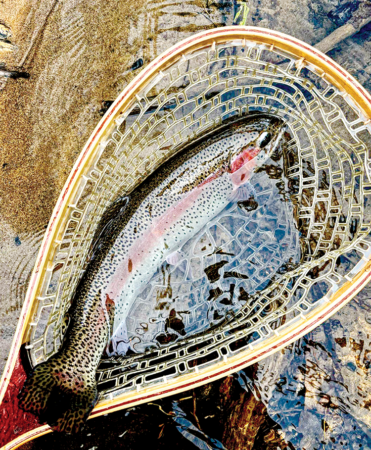When you spend as much time on the water as I do, you always catch a few. And while some days are certainly better than others. You occasionally have those fantastic experiences. These little episodes are extremely rare. I can count them with my fingers.
This past Thursday, I was on Lycoming. I parked my car and said hello to Kevin. He and his lovely bride are so good to Jensen. I will refrain from using any last names. I want to keep my whereabouts a secret. Let’s just say my friends have the nicest yard in Cogan Station. Tonight, I was fishing one of my favorite stretches. I know this area quite well, and I am amazed at how it constantly produces. This run isn’t near a major stocking point. But the trout always gather in large numbers — usually a few weeks after the opener. I always encourage my friends to find the “good spots” on a river or stream. Fish are always on the move, and they will eventually migrate to these pools.
Stocked fish sometimes get a bad rap. I have learned to appreciate them, and they are what I target. These trout spend their earlier years in a nursery. Once they get to the desired size, they are released. Stocked fish will likely head downstream until they find some cover. They are in search of slower-moving water. Remember swimming upstream or battling the current isn’t something they are used to. Where do they go? The state of PA and many others have entertained this question. Several studies show that a Rainbow will leave its initial post after three days. One radio-tagged Bow swam an incredible 123 miles from their entry just 16 days after stocking. Browns will hang out a little longer. They will likely move after seven.
The changes in the diets of these critters are truly amazing. They are raised on pellets that are full of nutrients. Stocked fish quickly learn to adapt and begin finding natural food almost immediately. And after a few weeks in the stream, their diets will make a complete 180. Early in the season, stocked trout pay little attention to what’s floating by. They will only take the worms, minnows, power bait, and salmon eggs the weekend warriors throw at them. But then, all of a sudden, a light completely switches, and the stocked trout will start to feed on bugs. It is quite incredible. What triggers this response? STUPENDOUS.
I made a few casts near Reeder’s Rapids. I was bouncing a green Peeping Caddis off of the bottom. This is my go-to nymph on Lycoming early in the season. The water was up from yesterday’s rain. I fished for a good ten minutes to no avail. I considered packing up and trying another. But all of a sudden, I noticed a few splashes. I looked at the water, and it was bubbling with bugs. Those weren’t raindrops. They were sipping trout. There was a major Caddis hatch, and the fish started rising immediately. Little brown bugs were absolutely everywhere. Sip after sip. It was insane. There must have been at least 50 trout actively feeding in front. They came out of the woodwork.
Thankfully I had a few #16 Tans in my box. I quickly changed my current setup. I was no longer fishing below the surface. I was going to try my luck on top. I made a good cast to where I saw one that was actively feeding. This was an unbelievable frenzy. I made a slight twitch and saw a sudden splash. It was a healthy, stocked rainbow with superb coloring. I took a quick photo and released her. Second cast. Bang. The same result. This one was a little smaller but fought extra hard. Third cast. Boom. This was a monster — a healthy 18″ bow who battled immensely. Bugs were still in abundance. Fourth cast. Damn. I hooked a tree behind me. Oh no. What a mess. I had to start all over. Another cast. Whack. It was bedlam. I was on fire. Heck. I even tried it left-handed.
This madness continued, and I literally stopped counting. I have never seen so many bugs on the water. Trout were everywhere. Most were right in front of me. This was a major hatch that I was very fortunate to witness. I felt good about life, and I marveled at my successes. I wish my son was with me. He was at Hepburn Lycoming watching his cousin. I was only hoping he could get a little dry fly love. I landed a few more, and things started to slow. The Caddis were still buzzing, but the fish were gone. Ten minutes later. Everything stopped. No bugs. Nothing. It was incredible.
I reached out to several of my chums later that evening. Some were also on the water and had the very same experience. A few mentioned that it was indeed a Caddis hatch. Hopefully, there is room for a picture. It was one of the most prolific in recent memories. They, too, absolutely slayed them. Then it stopped. Like clockwork. Unbelievable. What an amazing evening of fishing near the homestead. One of the best I have EVER had. Thanks again, Kevin. Cheers.




